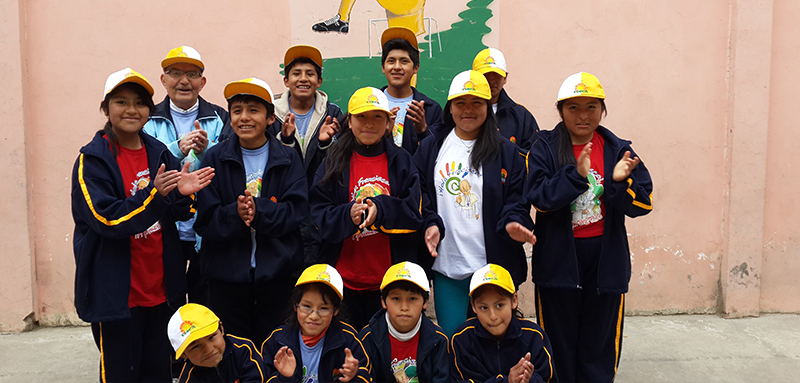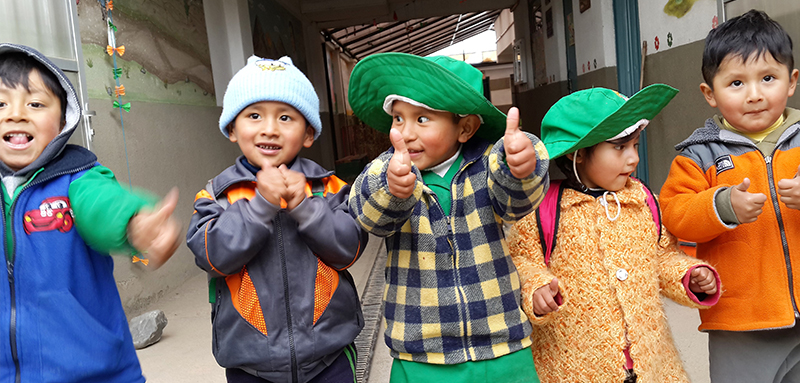Brother Andrès, a Divine Word missionary talks to us about his work with the less-fortunate children in Bolivia.
P. What is CINCA and how was it founded?
R.- CINCA: Centro Integral de Niños de la Calle (Integral Centre for Street Children), is a non-profit making organization that was founded in 1992 after realizing the lack of schooling among the boys and girls of El Alto, in La Paz-Bolivia, without access to neither public nor private education due to lack of resources and social exclusion. “It is part of the social works carried on by the Congregation of the Divine Word Missionaries” (Article 1 of the Statutes). It enjoyed both juridical legal capacity (Nº 0201) and ecclesiastical legal capacity (Res. 0201), as far as the Bolivian legislation was allowing to have both. The new Bolivian Law allows only one legal capacity and so CINCA has only the Ecclesiastical one.
P. And how was it founded?
R.-Seeing and feeling the reality. Being there and listening to the reality: the children all day in the streets without schooling and eating whatever hard bread that anyone would give to them. Playing with them the marbles and one time myself losing the game, but well, winning their confidence. Sitting on the floor they were taking initiative to narrate the situation in their families. Really tragic.
The words of Jesus (Mt 25:35) “I was hungry, thirsty, naked…,” was a continuous resounding inside me. He clarified that he arrived destined for El Alto-Bolivia already 52 years of age, on 29 January 1992, But I was already familiar with the place thanks to two previous visits with two groups of young people for work camps in the summer of 1990 and 1991.
Thanks to the first initiative that we called “Stabilization and School Aid”, we were able to begin the long journey of CINCA, attending to the first group of children in the garden of St. Mary’s Parish. In the beginning there were eight children, that we attended with the help of two young ladies’ catechists and the unconditional help of the then Parish Priest Fr. Felix Bannigan, SVD. A little later we got financial help from NGO Manos Unidas, campaign against hunger, from Spain, and it was with their help that we constructed our first building that had two rooms, a dining hall and a toilet. Two years later we were able to construct also a beautiful kitchen funded by the Government of Navarra (Spain).
Almost from the beginning we benefited from the help of the Mission Secretary, also from the Divine Word Missionaries, Estella, through the recruitment of “sponsors campaign”. We got help also form the NGO Alba. This one has acquired for us occasional or precise help. The biggest percentage of the public grants acquired along the years in the history has been through NGO Alba, thanks to their effective processing of financial resources in relation with the municipalities of Alcorcon, Dueñas, Valladolid, Olaberria, Idiazabal, Treviño, Santander, Villaralbo, Zamora, Alcala de Henares and Las Rozas.
ALBA has also obtained precise resources for CINCA thanks to their institutional relationship with the autonomous government of Cantabria, Navarra and Castilla y Leon. Also the collaboration of the Palencia Province, the Spanish Agency for international Cooperation for Development (AECID), The Sisters from the Province of GAP, as well as from Virgin of Alba of Alcorcon, Our Lady of Assumption of Dueñas, St. Mary of Ontinyent, Our Lady of Bethlehem, St. Isidro, Mary the Helper, Our Lady of Pilar and Saint Ignatius of Loyola of Valladolid parishes. These were the golden years without “economic crisis” in Spain.
CINCA also processed directly some aid from Germany, Ireland and Italy for mini projects. With the good fruits obtained from the experience, the number of the beneficiaries continued to grow progressively year after year, and logically also the demand for our services, that we were obliged to offer in a more structured manner and in accordance to the Bolivian legal norms; making steps to contract qualified personnel who would take charge of giving classes, prepare the meals, give psychological and social care to the girls and boys, take care of administrative work, among others.
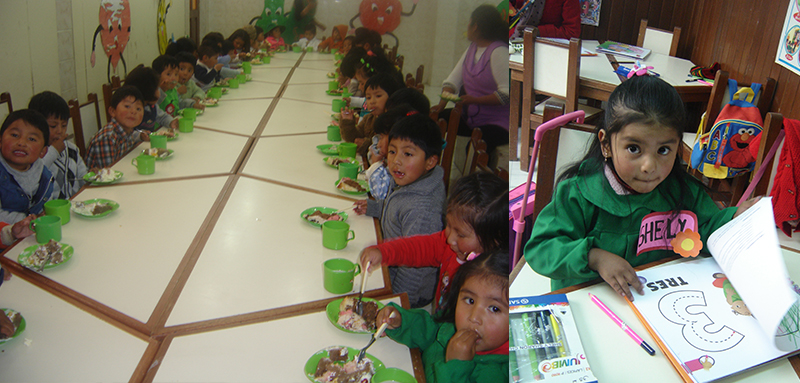
P. What are the services that you offer to Bolivian girls and boys?
R.- We are proud to tell you that apart from our first initiative, of “School and Dining-room service”, we have two other areas where we care for the needy girls and boys according to their social and family as well as juridical conditions that include the two orphanages, where we receive girls and boys without families and also where we offer preparatory schooling to the neediest children.
P. How does the Stabilization and Schooling Aid initiative function?
R.- First of all I would like to say, for this just as for all of our activities, that we count on personnel carefully selected from our department of human resources so as to avoid possible problems of abuse or of any other sort, that could put in danger the children. The Stabilization and Schooling Aid program has its headquarters in 16 de julio and Yunguyu de El Alto estates. In these two centers we take care of 175 beneficiaries between 6 and 18 years of age, to stabilize them academically and facilitate them to enroll formal schools. Also we have cases of girls and boys who go to school but in very dangerous situations such as abandoning classes due to lack of material resources as well as lack of proper family situation to do their homework. It is in our installations that they find the necessary resources, bearing in mind that apart from offering them psychological care and the place, they also get school materials and meals.
P. And the Preparatory school?
R.- In the Preparatory School situated in 16 de julio of EL Alto estate, and also in Yunguyu Estate, the beneficiaries are between 3 and 5 years of age. They are girls and boys who do not receive proper attention in their homes during the day, and so they come to the center where they get integral education as well as psychometric attention in different specializations. Also they have monthly weight and height control done by one nutritionist. We strive to always have intellectual, moral formation, good conduct, hygiene and balanced diet; all these watered with a good dose of affection. The personnel contracted and the volunteers have their grade of specialization for the preparatory school.
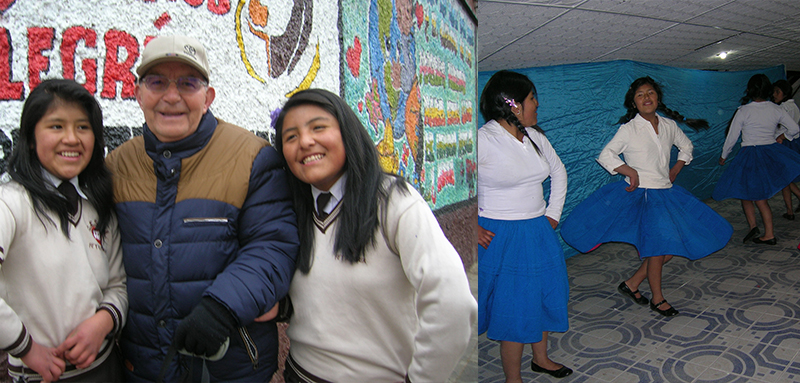
P. Who are the beneficiaries of the orphanage?
R.- the orphanages are two or three depending with the number. Currently we have 22 boys, girls and adolescents that come from destroyed families with juridical problems as well as some without any family references. All these beneficiaries come to the orphanage after the corresponding study and coordination among ourselves, the Defender of the Minors and Social Legislation of the town of El Alto and finally with the resolution of the Minors’ Court. All these steps are done according to the existing legal regulations. The number of the beneficiaries vary according to the opportune reintegration to the families. In CINCA they are cared for until they reach the adult age. Here they sleep, eat, attend the surrounding schools. They also participate, together with their schoolmates, in extra-curricular activities, receive psychological attention and, definitely, love and affection as well as the attention of the people who care for them, especially those directly responsible that they normally call: “mamas” and also more intimately “Aunts”. We make sure that all the programs and activities develop in a climate very close to that of a family.
P. Where do you invest the resources that you receive from the institution?
R.- The majority of the economic resources that are deposited in our institution account are donations from people with very big hearts that dedicate themselves in helping others. At the moment we continue to count on the benefactors who help us through the Mission Office of the Divine Word Missionaries and the same through ALBA NGOD. These funds go to pay the salaries of the people who educate and attend to our beneficiaries: their food and hygiene, health, education, integral formation, and most definitely to the maintenance of the physical structures where we carry out our work. CINCA is a nonprofit institution, and for this reason cannot use any of these resources in any other business other than in the one for which we work. We employ the services of external auditors.
P. Which is the actual panorama of CINCA?
R.- It is true that our institution continues functioning well and it is still possible to offer the girls and boys better life by our actions, but it is also true that CINCA could disappear if we do not manage to increase, in a short time, the public and private collaboration. We have got to say it: this activity is not like a project that is carried out and then comes to an end, here we are talking about children that we receive and that finish their period in the center but behind them there is a queue of needy girls and boys that we need to receive as well.
We are conscious of the fact that we depend on people and institutions from Spain and occasionally from other countries, that feel for this cause and have been contributing with us for years, but we cannot hide the reality that since we stopped receiving help from the public institutions, our worries and strategies have multiplied geared towards acquiring the means necessary to achieve the integral help that we give to these people, but we are far from achieving it and, as I have mentioned, we trust in the generous benefactors that, moved by the strength of the message of Jesus, make possible the continuation of this work.
We do not want to stop seeing these girls and boys or their families happy, smiling because they form part of the institution; their smile would vanish if CINCA closed its doors today, because they know that if it is not there, they would be condemned to live the way of cross, that is, living in the streets or in situations of extreme poverty for lack of opportunities. Therefore, I would like to use the opportunity in these lines to appeal to our collaborators to continue accompanying us in our journey, and those that will know us from now on, to add to our list of contributors so that this way we can continue to demonstrate the great human capacity that we have, the Spanish, people to help our neighbours.
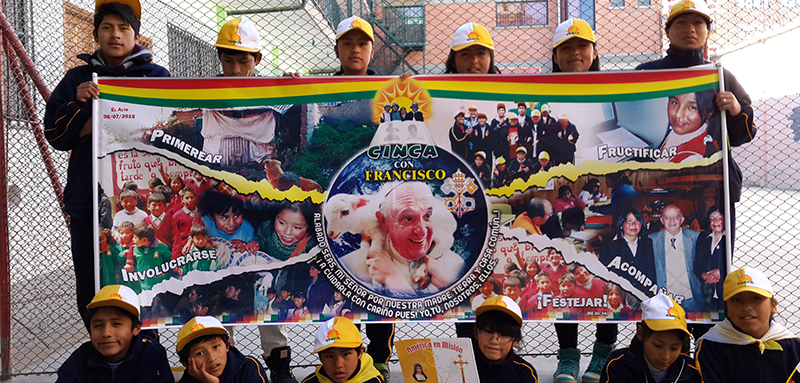
Chronological evolution of CINCA
1992: the bases of the foundation of CINCA is put in 16 de julio estate of El Alto-La Paz in Bolivia. The classes were being conducted in the garden offered by St. Mary’s Parish, run by the Divine Word Missionaries.
1994: the first physical structure belonging to the institution is opened in 16 de julio estate. The beneficiaries have increased and with the new structures they can be more comfortable to do their chores.
1996-1998: CINCA constructs 3 houses in El Alto-La Paz in Bolivia, that were given to the families of the girls and boys that were in the project CINCA, being able this way to benefit indirectly 245 persons.
2001: Inauguration of a building to be used for the functioning of the Preparatory School and for the administrative work of CINCA.
2007: Inauguration of a multipurpose building in 16 de julio estate, where we have the actual orphanage, the Center for Stabilization and Academic Aid and a Public Library. About the library, given the dawn of the digital and internet era, there are only a few students who come. it also has a few commercial spaces and a few rental apartments with which we try to get new financial income. During this same year a new Center for Stabilization and Academic Aid was inaugurated in Yunguyu zone in El Alto-La Paz, thanks to the contribution of the Missionaries of the Providence of GAP. It remains clear that since the year 2008 the activities of CINCA have been limited to the functioning of the institution, every time that with the Spanish financial crisis, the non-profit grants that we were receiving have registered a notable decrease, which has curtailed the growth of its infrastructure, the services it offers and definitely the number of beneficiaries.
The volunteering promoted by CINCA: About 70 volunteers have travelled from Spain to CINCA headquarters in Bolivia, for a visit or staying for a certain period of time, some months or years, to develop accompaniment programs for the beneficiaries of the center, turning themselves into ambassadors of this important social work that is written in South-American soil with Iberian ink.
Would you like to contact CINCA? Then write your worries or suggestions to CINCA, Casilla 8116, La Paz-Bolivia to the following e-mail addresses: cincadir@gmail.com or andreslorenzoca@gmail.com.
Thanks a lot
